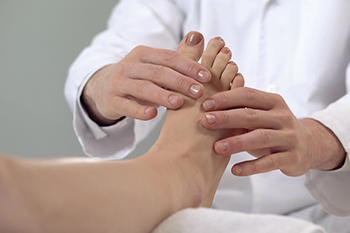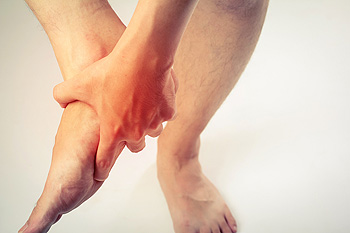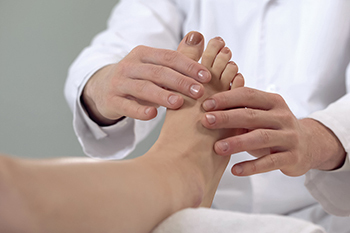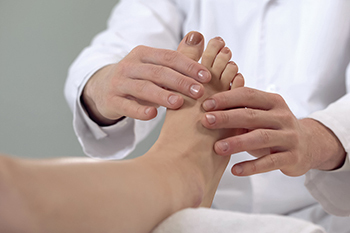Connect With Us
Blog
Items filtered by date: September 2022
Swelling of the Feet in Hot Weather

When your feet become swollen, bodily fluids accumulate in the feet and ankles, which can make your skin look puffy and cause sensations of stiffness when putting weight on the feet. Swelling of the feet has numerous causes, however one often overlooked cause is hot weather. Some individuals might be particularly susceptible to what is known as heat edema, which is essentially swelling that comes about when standing for a prolonged period of time in hot environments. To avoid heat edema, you might consider keeping your body cooler in temperature by staying in the shade when outdoors. Additionally, it might be important to stay hydrated by drinking a sufficient amount of water to combat heat edema. This is done to reduce your body's concentration of salt and can ultimately lower your retention of bodily fluids. Contact a podiatrist today to learn more about heat edema and feet swelling in hot weather.
Swollen feet can be a sign of an underlying condition. If you have any concerns, contact one of our podiatrists of Palm Beach Foot & Ankle. Our doctors can provide the care you need to keep you pain-free and on your feet.
Swollen feet are a common ailment among pregnant women and people who stand or sit for extended periods. Aging may increase the possibility of swollen feet and patients who are obese often notice when their feet are swelling too. There may be medical reasons why swollen feet occur:
- Phlebitis - A condition that causes the veins to become inflamed and can also cause leg pain.
- Liver disease - This may lead to low blood levels of albumin which is a protein. This can cause fluid in the blood to pass into the tissues and several areas of the body can become swollen.
- Heart failure - When the heart doesn’t pump properly the blood that is normally pumped back to the heart can pool in the veins of the legs causing swollen feet.
- Kidney disease - One of the main functions of the kidneys is releasing excess fluid in the body. This type of condition can make it difficult for the kidneys to function properly, and as a result the feet may become swollen.
- Deep-vein thrombosis (DVT)- This is a serious condition where blood clots form in the veins of the legs. They can block the return of blood from the legs to the heart which may cause the feet to swell. It is important to be treated by a podiatrist if this condition is present.
Swollen feet can also be caused by bone and tendon conditions, including fractures, arthritis, and tendinitis. Additionally, there may be skin and toenail conditions and an infection may cause the feet to swell. Patients who take medicine to treat high blood pressure may be prone to getting swollen feet.
Many patients elevate their feet to help relieve the swelling and this is generally a temporary remedy. When a podiatrist is consulted the reason behind the swelling can be uncovered and subsequently treated.
If you have any questions please feel free to contact our offices located in Boynton Beach, Palm Beach Gardens, and West Palm Beach, FL . We offer the newest diagnostic tools and technology to treat your foot and ankle needs.
Are You Suffering From Ingrown Toenails?
What Is Morton’s Toe?

Morton’s toe is a foot condition that is obvious as the second toe is longer than the first toe, or big toe. Research has indicated it affects approximately ten percent of the population, and may cause foot pain. Many people may refer to this ailment as Greek toe, and this is a common sight on classic Greek sculptures. Morton’s toe develops from purely genetic reasons, and it is determined by the long bones in the foot, which are called the metatarsal bones. Pain may gradually develop during the beginning stages of taking a step, and this is the result of pressure that is exerted on the longest toe, which is the second toe in patients who have this condition. It can cause the foot to roll excessively inward, and may be controlled by wearing custom-made orthotics. Mild relief may be found when shoes a half size larger are selected, and this may help to diminish some of the pressure. If you have Morton’s toe, and are experiencing foot pain, it is suggested that you consult with a podiatrist who can help you to manage this foot condition.
Foot Pain
Foot pain can be extremely painful and debilitating. If you have a foot pain, consult with one of our podiatrists from Palm Beach Foot & Ankle. Our doctors will assess your condition and provide you with quality foot and ankle treatment.
Causes
Foot pain is a very broad condition that could be caused by one or more ailments. The most common include:
- Bunions
- Hammertoes
- Plantar Fasciitis
- Bone Spurs
- Corns
- Tarsal Tunnel Syndrome
- Ingrown Toenails
- Arthritis (such as Gout, Rheumatoid, and Osteoarthritis)
- Flat Feet
- Injury (from stress fractures, broken toe, foot, ankle, Achilles tendon ruptures, and sprains)
- And more
Diagnosis
To figure out the cause of foot pain, podiatrists utilize several different methods. This can range from simple visual inspections and sensation tests to X-rays and MRI scans. Prior medical history, family medical history, and any recent physical traumatic events will all be taken into consideration for a proper diagnosis.
Treatment
Treatment depends upon the cause of the foot pain. Whether it is resting, staying off the foot, or having surgery; podiatrists have a number of treatment options available for foot pain.
If you have any questions, please feel free to contact our offices located in Boynton Beach, Palm Beach Gardens, and West Palm Beach, FL . We offer the newest diagnostic and treatment technologies for all your foot care needs.
Prevention of an Achilles Tendon Injury

Tendons connect muscles to bones. The Achilles tendon, the largest and strongest tendon in the body, connects the lower part of the calf muscles to the heel bone. This tendon helps the calf muscle in pointing the toe or doing a calf raise, and aids in all movement of the ankle joint. When it is overworked or inflexible, it is at risk for injury. Damage to the Achilles tendon can include strain, rupture, or tendinitis. The most common injury to this tendon is tendinitis. This can happen when the tendon is stressed from repetitive movements like running or jumping, or from a change in an athlete’s training program. Additionally, it may happen as a result of training at a level the body cannot handle, or from having inflexible calf muscles. Achilles tendon injuries can be prevented with frequent lower leg stretches, strengthening the calf muscles and Achilles tendon, and engaging in appropriate training for a sport. Shorter, easier workouts should gradually progress to becoming longer, and more difficult. Decreasing the activity that caused pain, and resting are the first things one should do if they have injured their Achilles tendon. If you have pain in your Achilles tendon that continues or worsens, it is suggested that you consult with a podiatrist for a proper diagnosis and treatment plan.
Achilles tendon injuries need immediate attention to avoid future complications. If you have any concerns, contact one of our podiatrists of Palm Beach Foot & Ankle. Our doctors can provide the care you need to keep you pain-free and on your feet.
What Is the Achilles Tendon?
The Achilles tendon is a tendon that connects the lower leg muscles and calf to the heel of the foot. It is the strongest tendon in the human body and is essential for making movement possible. Because this tendon is such an integral part of the body, any injuries to it can create immense difficulties and should immediately be presented to a doctor.
What Are the Symptoms of an Achilles Tendon Injury?
There are various types of injuries that can affect the Achilles tendon. The two most common injuries are Achilles tendinitis and ruptures of the tendon.
Achilles Tendinitis Symptoms
- Inflammation
- Dull to severe pain
- Increased blood flow to the tendon
- Thickening of the tendon
Rupture Symptoms
- Extreme pain and swelling in the foot
- Total immobility
Treatment and Prevention
Achilles tendon injuries are diagnosed by a thorough physical evaluation, which can include an MRI. Treatment involves rest, physical therapy, and in some cases, surgery. However, various preventative measures can be taken to avoid these injuries, such as:
- Thorough stretching of the tendon before and after exercise
- Strengthening exercises like calf raises, squats, leg curls, leg extensions, leg raises, lunges, and leg presses
If you have any questions please feel free to contact our offices located in Boynton Beach, Palm Beach Gardens, and West Palm Beach, FL . We offer the newest diagnostic tools and technology to treat your foot and ankle needs.
What to Consider When Children’s Shoes Are Purchased

The coronavirus brought times to the world where children were homeschooled, and time was limited for physical activities because of threatening germs. The type of shoes children wore were often overlooked as shoe stores were closed and new shoes were rarely purchased. As current times are upon us and children have returned to school, the first step in choosing the correct shoes for your child generally starts with getting the right shoe size. This is done by properly measuring the foot using a Brannock device, which is found in most shoe stores. The type of shoe that is desired is often considered, in addition to the material that it is made from, if they are lightweight, and have protection and flexibility. And lastly, the shoes need to fit comfortably from the moment they are tried on and should not need a break in period. Children that live in various climates and environments typically will wear different types of shoes and how long the shoes are worn is often considered. If you have questions about what type of shoes your children should wear, please schedule an appointment with a podiatrist.
Making sure that your children maintain good foot health is very important as they grow. If you have any questions, contact one of our podiatrists of Palm Beach Foot & Ankle. Our doctors can provide the care you need to keep you pain-free and on your feet.
Keeping Children's Feet Healthy
Having healthy feet during childhood can help prevent medical problems later in life, namely in the back and legs. As children grow, their feet require different types of care. Here are some things to consider...
Although babies do not walk yet, it is still very important to take care of their feet.
Avoid putting tight shoes or socks on his or her feet.
Allow the baby to stretch and kick his or her feet to feel comfortable.
As a toddler, kids are now on the move and begin to develop differently. At this age, toddlers are getting a feel for walking, so don’t be alarmed if your toddler is unsteady or ‘walks funny’.
As your child gets older, it is important to teach them how to take care of their feet.
Show them proper hygiene to prevent infections such as fungus.
Be watchful for any pain or injury.
Have all injuries checked by a doctor as soon as possible.
Comfortable, protective shoes should always be worn, especially at play.
If you have any questions please feel free to contact our offices located in Boynton Beach, Palm Beach Gardens, and West Palm Beach, FL . We offer the newest diagnostic and treatment technologies for all your foot and ankle needs.

